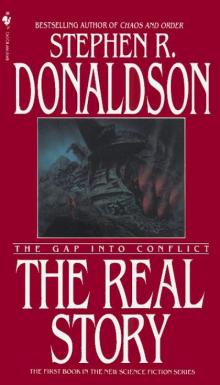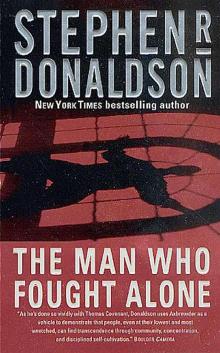- Home
- Stephen R. Donaldson
The Real Story: The Gap Into Conflict Page 10
The Real Story: The Gap Into Conflict Read online
Page 10
Destinations. Cargoes. Arrival dates. Departure trajectories. Route clearances.
Nick worked scan. Indirectly, at least, he had access to that kind of information.
Even as a youth, hardly a young man yet, he was someone whose chances came to him when he needed them, when he was ready for them. As soon as he was sour enough, and had made his plans sufficiently concrete, and had developed his access to information, he met the woman who scarred him.
The scars came later, of course. She knew what she was doing and did it well. First came casual conversation. Casual drinks. Casual sex. His first casual mention of Captain’s Fancy passed as if she hadn’t heard it. Only after he’d told her enough about his plans, his information, his needs—only then did she let him see the hunger in her eyes.
She wanted that ship.
And he was really just a kid. He didn’t have any trouble convincing himself that she wanted Captain’s Fancy the same way he did.
So he betrayed the ship he loved. He thought he would end up as part of her new crew. Eventually—so the dream went—he would end up as her new captain.
For what he later swore was the last time in his life, he was wrong.
The woman took him with her aboard her own ship. He was with her as she ambushed Captain’s Fancy, crippled the merchanter, forced the vessel to surrender. He accompanied her when she boarded the drifting hulk.
Already reality diverged from his dream. Captain’s Fancy wasn’t supposed to be ruined like this. As for the regal captain and his crew—Nick wanted them humiliated, of course; but he was a bit young to stomach such frank slaughter.
Nevertheless reality continued to diverge.
The woman didn’t take him with her when she left. After killing the crew, emptying the holds, gutting the communication gear, she laughed at Nick and scarred him and abandoned him.
He pleaded, of course. He believed he loved her. He believed she loved him. He was young enough to have persuaded himself of almost anything for the sake of his dreams. But his ideas of love only made her giggle in scorn. Her knife told him what she thought of having him in her bed. When she left, there were tears streaming through the blood into his mouth.
After that, he was alone on a wreck a million kilometers from the station, with no skills, no knowledge—and no engines. By rights, he should have died.
He didn’t. Instead, he became the Nick Succorso he was now. By the time he’d contrived to be rescued—some rather ingenious manipulation of Captain’s Fancy’s residual emissions produced the effect of a beacon and eventually attracted a passing cruiser—he’d assumed the id files and certifications of the ship’s cabin boy, the real Nick Succorso, and had taught himself the skills to back up his new credentials.
Once rescued, of course, he’d given the UMCP everything he knew about the woman who cut him. That enabled them to harry her out of his part of space. He never saw her again.
Naturally, however, he never forgot her. From the time of his first legitimate shipboard post until the day when he snatched the present Captain’s Fancy for himself, from the moment of his first successful raid until now, she was always with him. His scars grew dark under his eyes whenever he saw something he wanted, something that wasn’t his; the slashes on his cheeks turned the color of curdled blood.
Under other circumstances, he wouldn’t have lifted a finger to help Morn Hyland. Women in pain were the next best thing to women who loved him. Both pain and love helped him get even.
But under these circumstances—
Nick Succorso was drawn to the idea of rescuing Morn for several reasons. Angus Thermopyle himself was one of them. Nick knew Angus’ reputation, of course: he knew Angus wasn’t just a competitor; he was a dangerous competitor. And Nick was prepared to tolerate competition only as long as it wasn’t good enough—wasn’t dangerous enough—to get in his way; to cast him in the shade. He saw Morn Hyland immediately as a handle on Angus, a lever to use against the competition.
His other reasons were more complex.
Her relevance—if any—to his concerns as the master of Captain’s Fancy was unclear. Did he see her as a source of wealth? Did he mean to exact ransom from the Hyland family? From Com-Mine Station? The UMCP itself? He may have had a source of information about her that wasn’t generally available. If so, he didn’t mention it.
However, her relevance to his personal buccaneering was plain enough.
In some of its details, her condition was obvious at a glance. She was attached to a man she hated, fixed to an illegal who repelled her. What did that imply about her? On this point, his reasoning was unique in Mallorys. For him, her attachment implied, not that she was subject to coercion, but that her capacity to respond was so intense, so overwhelming, that she couldn’t control it. She couldn’t help herself.
And if she had that kind of response to someone like Angus Thermopyle, if her own passions left her that abject—
Nick Succorso’s scars darkened and his mouth actually went dry at the thought of how Morn’s passions might make her respond to him.
So Angus Thermopyle was wrong about Nick—as wrong as he was about Morn herself. But he was also right. The danger was real. Without a word to each other, with no more contact between them than a gaze or two, they had banded together against him.
And he had to face it all, realize it all, and swallow it, show nothing. Instinct was of no use to him here. He was cornered by his situation, trapped with a perception he would have cheerfully committed murder to avoid. He needed money. Therefore he needed Mallorys; needed the people who came to Mallorys and sold secrets. In addition, Security was watching him. Even in DelSec, there were spies. He was being studied for any sign of a mistake, scrutinized for any evidence of weakness. He couldn’t afford to give himself away by retreating; by revealing that he recognized his danger.
He stayed where he was, keeping his mask of belligerent disinterest in place, simply because he was afraid of the consequences if he did anything else.
Gruffly he ordered Morn to a seat at one of the condensation-stained tables—a seat with her back to Nick Succorso. He made sure the way he talked to her was loud enough to be overheard, so her obedience would be noticed. Then he sat down beside her and squeezed her against him possessively. Look at us, you bastards, you motherfucking sons of shit. Look at her. She’s mine. Mine!
He put on a good performance. Nobody in Mallorys knew that he’d witnessed the way Morn and Nick looked at each other, that he’d felt the electricity between them. But his success gave him no satisfaction. It was Morn he wanted, her desire, her willingness—the parts of herself which he’d been unable to extort from her; the parts which she’d just given away.
He was going to have to kill Nick. There was no other answer. There was no other way to hurt her enough, to punish her for doing this to him.
Through a haze of rage and grief, he ordered drinks he didn’t want and paid for them. He heard people talking around him. Some of them spoke to him. He spoke to some of them. The ones who mattered knew why he was here, what he wanted; he didn’t need to go looking for them, not yet.
By no flicker of attention or shift of expression did Morn betray she knew Nick Succorso was alive. But Angus read the heightened hue of her skin and thought he understood it.
Through sheer force of panic, he stayed in Mallorys for more than an hour: long enough to appear normal; to ensure the word would be passed that Angus Thermopyle was back on station; long enough so no one would guess he was afraid. Then he took Morn back to Bright Beauty.
She expected trouble. He saw it in the covert way she glanced at him, in the concealed alarm and compliance of her posture. She had a secret now, an intention she needed to protect. Well, good for her. He meant trouble. He was perfectly willing to defile and humiliate every inch of her to take the sting out of his heart. His stomach was a knot of black hate, and his brain was so full of violence he could hardly keep his balance.
When they’d boarded the ship, he made
a deliberate and meticulous show of sealing the hatches, rigging security alarms, cutting off communication; isolating Bright Beauty from the Station, as if he wanted to prolong the suspense for her, give her every chance to be terrified by what was coming.
After that, he engaged her zone-implant control.
He planned only to make her passive. He wanted her to see and feel everything he did. But his fingers seemed to have a mind of their own. His whole body ignored the dark ruin clamoring inside him. Instead of tuning Morn to passivity, or even catatonia, he pushed the buttons which put her to sleep. Then he scooped her up in his arms and carried her to a berth.
He settled her on the thin mattress; adjusted a pillow under her head; tucked a blanket around her, securing it to its g-seals. While his stomach clenched and tore, and his brain reeled, he left her and closed off the passageway to her cabin, locking himself alone in the command module.
Then he started to howl like a grief-stricken beast.
CHAPTER
12
He would have been better off if he had gone to a bootleg shipyard, of course. Perhaps he could have sold Morn’s favors for the money he needed to get Bright Beauty made whole. Power over her would have brought a much higher price there than on Com-Mine Station. And—assuming Nick Succorso followed him—he could have faced his enemy in a more naked and therefore fairer arena.
He would have been better off if he’d simply undocked from Com-Mine Station, launched a few torpedoes at Captain’s Fancy, and then fled for his life.
He would have been better off if he’d killed Morn Hyland and ashed her in Bright Beauty’s thruster tubes.
In fact, from moment to moment during the next two standard weeks he fully intended to do any one or all of those things. But he didn’t.
Instead, he worked on arranging Nick’s destruction.
First, of course, he took care of Bright Beauty. He had her serviced as thoroughly as possible without major repairs. He paid for X-ray analysis to test her shell and bulkheads for metal fatigue. He bought all the new components he could afford. And he gave her name and id letters a fresh coat of paint.
At the same time, however, he asked questions whenever he could. He paid sums which nearly broke him for information—even for hints. And finally, guided by those hints, for one brief, glorious moment he succeeded at breaking into the Station’s main computer. Before the computer’s security systems forced him to retreat so that his intrusion wouldn’t be traced, he pulled as much data as he could.
By some standards, it wasn’t much. Routine files aside, all he gleaned was the codes and routing by which Captain’s Fancy talked to the Station’s computer network.
In theory, this knowledge was useless to him. After all, he couldn’t get at the physical lines which carried Captain’s Fancy’s business to the computers and back again. Anything that tampered with the integrity of those lines would register immediately. And knowledge of the codes and routing was pointless without access to the actual data-stream.
Angus was desperate, however. In his own opinion, he’d lost his mind. In self-defense, he put Morn to sleep, so that she wouldn’t know about and couldn’t interfere with what he did. Then, hyperventilating so hard that his suit could hardly keep up with it, and sweating like a beast, he went EVA.
He got away with it because it was such an odd thing to do. People who wanted to work outside their ships did so in the shipyard, over on the other side of Com-Mine. And only men as suspicious as Angus himself scanned the ships around them while they were in dock. Apparently Nick Succorso wasn’t that suspicious. Or maybe he had too much confidence in his own invulnerability. Nobody noticed what Angus was doing.
Clamped to the metal surface with limpets, and keeping his head turned grimly away from the fathomless starfield, he moved along the staggering curve of Com-Mine’s skin from Bright Beauty to Captain’s Fancy. When he got there, he used a current sensor to read each of the lines connecting the ship to the Station until he identified the one that carried the data-stream. Then, with savage care, he wrapped a dummy line tightly around it from output to receptacle and ran the dummy back to his ship.
Aboard Bright Beauty again, he didn’t give himself time to recover from the ordeal of EVA. He was obsessed. His hands shook in eagerness and fear as he sent power down his line, surrounding Captain’s Fancy’s data-stream with a delicate magnetic field. Then he put a scope on his fine and watched the field for fluctuations.
It worked. Under full boost, his scope began to show a swift series of spikes and scoops, a fluttering progression too quick for the eye to interpret.
His computer had the codes and routing: now it had an echo of the actual data-stream. Soon he could call up a display of everything Captain’s Fancy and Com-Mine Station said to each other.
Under different circumstances, his interest in this information would have been specific and temporary. He would have used what he knew to plunder Nick’s finances, transfer to himself everything Nick owned. It wouldn’t have been difficult to make that kind of computer transaction untraceable, using his own codes and routing. Then he would have detached his dummy line and sat back, daring anyone aboard Captain’s Fancy to guess what had happened.
Now, however, Angus had other plans.
In a sense, the situation was simplified by the fact that Nick didn’t have enough money to repair Bright Beauty. Despite his successful air, he was no wealthier than Angus. Without that temptation, Angus had an easier time stifling the impulse to touch or alter anything he found. He didn’t want to warn his enemy of the danger, didn’t want to let Nick know he was being stalked.
Instead of tampering with the data-stream, he programmed his computer to alert him if any one of a long list of key words and names appeared in the ship-Station dialogue. As an afterthought, because he was inherently suspicious, he told the computer to do the same if any unidentifiable codes were used.
Then he left Bright Beauty and went about the business of behaving normally.
When he returned to his ship and reviewed what his computer had gleaned, he found no mention of himself or Morn or anything he could recognize. He learned only that Nick Succorso was faithful about logging in and out of Captain’s Fancy.
And Nick had received two messages in a code Angus’ computer didn’t recognize and couldn’t crack.
Angus had no way to read those messages. But he could trace them because he already knew the routing.
They came from Station Security.
When he discovered that, he wanted to laugh and scream and break something and celebrate all at once. It was the perfect touch—the final reason why his bluff had worked. There was in fact a leak in Security, a traitor. Why else would Nick Succorso be receiving coded messages from that source? The vacuum-based accusation Angus had prepared to protect his hold on Morn had hit Com-Mine’s inspectors where they lived: its blind accuracy had given it an almost prescient credibility.
And Nick Succorso’s swashbuckling success was based on inside information. He had an ally in Security; a friend in power.
Characteristically, Angus didn’t worry about why. He didn’t even care about how. The fact itself was all that interested him.
Nick Succorso had an ally in Security.
That made him more dangerous. But it also diminished him. He didn’t stand on his own: he was a good face with nothing behind it; empty bravado. A nerve-juice addict could do everything he did—as long as the junkie had inside information to back him up, a friend in power. Nick could sneer at anybody he wanted; but it only mattered because he had Security on his side.
“You bastard,” Angus muttered through his teeth. “You shit-eating bastard. I’m going to rip your balls off.”
It was just a question of when and where.
CHAPTER
13
During this period—nearly a week—Morn Hyland spent most of her time either catatonic or asleep. When Angus wanted to use her, he did so without rousing her from the influence of her
zone implant. He didn’t want her to know what he was doing: he couldn’t take the risk that she might find some way to sabotage him. For that reason, he got her out of bed only for meals, or to go to Mallorys with him.
Every time he used her body, he hardened his resolve against Nick Succorso. And every time he took her out in public, the desire to protect her burned as brightly as terror in him.
But the second week was different. Now Angus timed his trips away from Bright Beauty to coincide with Nick’s absences from Captain’s Fancy. And he wore under his shipsuit a nerve beeper, a small electrode taped to the skin and set to tingle whenever Captain’s Fancy relayed a summons for Nick through Com-Mine communications, requesting his return to his ship. Taking Morn with him now to Mallorys was part of Angus’ plan, part of the bait. He wanted to make Nick see her and do something: he wanted to make Nick want her badly enough to take action.
In fact, he almost went so far as to buy her new clothes. She could be ravishing, if he gave her the chance. And he ached to do that, for his own sake as well as hers, so that she would be ravishing and his, like Bright Beauty with fresh paint.
But in the end he decided to keep her in her rumpled, illfitting shipsuit, not because of the money, but because of the danger. If she looked too good, she might attract trouble he wasn’t ready for. And there was always the possibility—he took it seriously only because he was too suspicious to do anything else—that Nick was smart enough to smell a trap when it was smothered in perfume.
He wanted Nick to do something because almost anything he did would give Angus an excuse to kill him—and would provide as well a plea of self-defense against any murder charge. Angus could be ready for almost anything because he knew more about Nick’s business and activities than Nick could guess.
And when Nick was gone, Angus would be in an ideal position to make use of what he knew about Station Security. Nick’s ally might become his. A little leverage, a little blackmail, might make it possible for Angus to live as well as Nick did now.

 The Illearth War
The Illearth War Last Chronicles of Thomas Covenant 02 - Fatal Revenant
Last Chronicles of Thomas Covenant 02 - Fatal Revenant Lord Foul's Bane
Lord Foul's Bane The Gap Into Ruin: This Day All Gods Die
The Gap Into Ruin: This Day All Gods Die White Gold Wielder
White Gold Wielder Fatal Revenant
Fatal Revenant The Mirror of Her Dreams
The Mirror of Her Dreams Against All Things Ending
Against All Things Ending The Real Story: The Gap Into Conflict
The Real Story: The Gap Into Conflict The Power That Preserves
The Power That Preserves Seventh Decimate
Seventh Decimate The Gap Into Power: A Dark and Hungry God Arises
The Gap Into Power: A Dark and Hungry God Arises A Man Rides Through
A Man Rides Through The Gap Into Vision: Forbidden Knowledge
The Gap Into Vision: Forbidden Knowledge The King's Justice: Two Novellas
The King's Justice: Two Novellas The Wounded Land
The Wounded Land The Runes of the Earth
The Runes of the Earth Mordant's Need
Mordant's Need The One Tree
The One Tree Gilden-Fire
Gilden-Fire Reave the Just and Other Tales
Reave the Just and Other Tales The Man Who Fought Alone
The Man Who Fought Alone The Last Dark
The Last Dark The Man Who Tried to Get Away
The Man Who Tried to Get Away Thomas Covenant 02: The Illearth War
Thomas Covenant 02: The Illearth War A Dark and Hungry God Arises
A Dark and Hungry God Arises The One Tree t2cotc-2
The One Tree t2cotc-2 Lord Foul's Bane cotc-1
Lord Foul's Bane cotc-1 The Illearth War t1cotc-2
The Illearth War t1cotc-2 The Runes of the Earth: The Last Chronicles of Thomas Covenant - Book One
The Runes of the Earth: The Last Chronicles of Thomas Covenant - Book One The King's Justice
The King's Justice White Gold Wielder t2cotc-3
White Gold Wielder t2cotc-3 The Power That Preserves t1cotc-3
The Power That Preserves t1cotc-3 Thomas Covenant 01: Lord Foul's Bane
Thomas Covenant 01: Lord Foul's Bane Chaos and Order: The Gap Into Madness
Chaos and Order: The Gap Into Madness Daughter of Regals
Daughter of Regals Forbidden Knowledge: The Gap Into Vision
Forbidden Knowledge: The Gap Into Vision Fatal Revenant t3cotc-2
Fatal Revenant t3cotc-2 The Runes of the Earth t3cotc-1
The Runes of the Earth t3cotc-1 Thomas Covenant 03: Power That Preserves
Thomas Covenant 03: Power That Preserves This Day all Gods Die: The Gap into Ruin
This Day all Gods Die: The Gap into Ruin The Wounded Land t2cotc-1
The Wounded Land t2cotc-1 This Day All Gods Die
This Day All Gods Die One Tree
One Tree